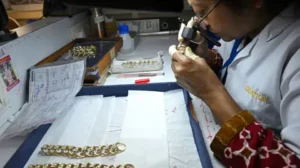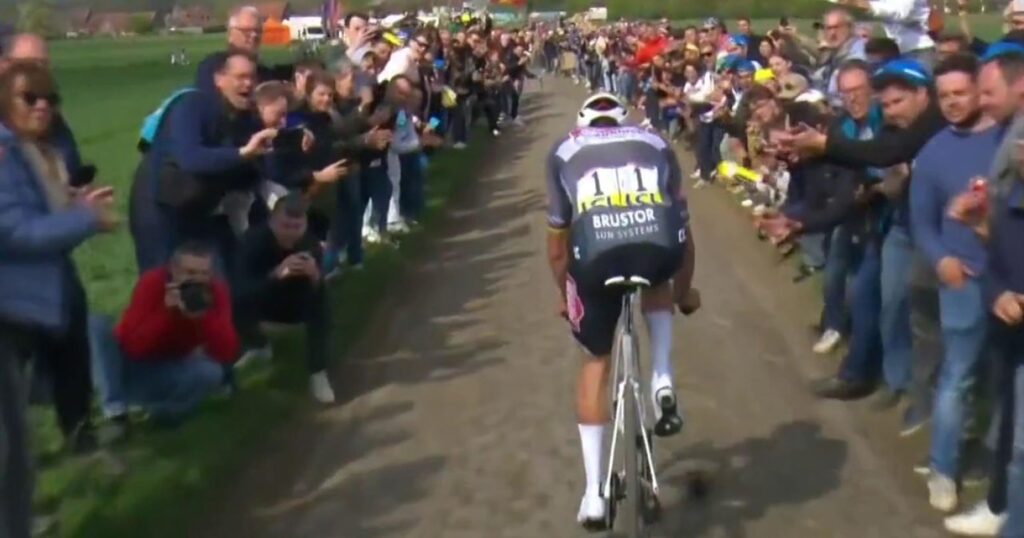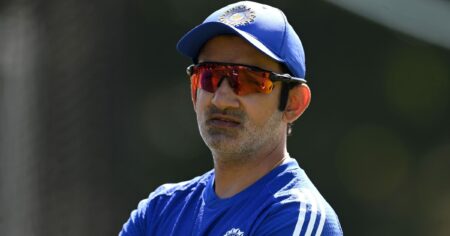On a recent Sunday, the world of professional cycling was rocked by a shocking incident during the Paris-Roubaix race involving renowned cyclist Mathieu van der Poel, who rides for Alpecin-Deceuninck. Prominent cycling commentator Matt Stephens highlighted the severity of the situation, stating that van der Poel could have faced career-ending consequences when a spectator hurled a full water bottle at him. Following this incident, van der Poel expressed his belief that the act constituted “attempted manslaughter,” emphasizing the gravity of the encounter, which he compared to a stone striking his face.
The incident prompted immediate responses, particularly from the cycling community and law enforcement. The spectator responsible for this reckless behavior surrendered to Belgian authorities the following Monday. Stephens, who previously held the title of British national road race champion, weighed in on the matter during TNT Sports’ Ultimate Cycling Show. He insisted that this case should serve as a clear example to deter future irresponsible actions from spectators. “It’s an assault because someone’s thrown an object clearly with intent – quite remarkably accurate,” he stated, highlighting the troubling trend of spectators crossing the line during races.
Stephens also drew attention to similar occurrences in the sport and noted that such behavior must be addressed firmly. He mentioned a previous incident during the Roubaix race the prior year, which underlines a worrying pattern of spectator-related disruptions in cycling events. He called for accountability, noting that it doesn’t matter if the suspect was under the influence or acting recklessly; the act of throwing an object at a cyclist is fundamentally serious, especially when the potential consequences could include severe injuries or even death.
The depth of potential harm was further underscored by Stephens, who posited that had van der Poel suffered a fractured skull or a more serious injury as a result of this incident, the ramifications could have transformed into something catastrophic. “We’ve got to realise that’s why Van der Poel is saying ‘attempted manslaughter’ because he was moving at speed on cobbles. He could have face-planted and it could have been a career-ender or worse,” he added.
The incident involving van der Poel also highlights a concerning trend regarding athletes being targeted by fans. Just last month, he was spat at during the E3 Saxo Classic, and he had previously confronted spectators who jeered at him during a cyclo-cross event in Hulst in early 2023. Such targeted aggression from fans raises questions about the safety and well-being of athletes in sporting events.
In context, Stephens reminisced about other historical instances where spectators exhibited questionable behavior during bike races, pointing out that “water was thrown on riders.” He underscored the need for such conduct to be eradicated from the sport. “That sort of thing needs to be stamped out,” he stressed, warning against creating an environment where spectators feel they can act similarly without fear of repercussions. He insisted that the sport cannot condone such dangerous behaviors and that any legal action taken against the spectator will serve as a necessary precedent to underline the seriousness of safety protocols at events.
During the race, van der Poel was in a strong position, aiming for a third consecutive victory when the incident unfolded. He had managed to break away from Tadej Pogacar of UAE Team Emirates, who unfortunately crashed as he attempted to close the gap. Despite the distraction and pain from the thrown bottle, van der Poel demonstrated resilience and was able to maintain his lead throughout the remainder of the race.
Reflecting on the incident, van der Poel articulated his feelings, stating that “we can’t let this slide.” He noted the potential injury a full bottle could inflict, candidly sharing, “If I get that water bottle on my nose, it’s broken.” He urged police to identify the individual responsible, demanding a trial for the actions, which he viewed not merely as unacceptable but deeply troubling for the sport. Furthermore, he insisted that if no appropriate action is taken by the Union Cycliste Internationale (UCI), he and his team are prepared to take their own measures to address the situation.
In conclusion, both Matt Stephens and Mathieu van der Poel’s responses underline the urgent need for stringent measures and the establishment of a more secure environment for athletes. The cycling community is taking serious note of this incident, and it raises awareness that spectator misconduct will not be tolerated in the pursuit of safe, fair competition in the sport.









